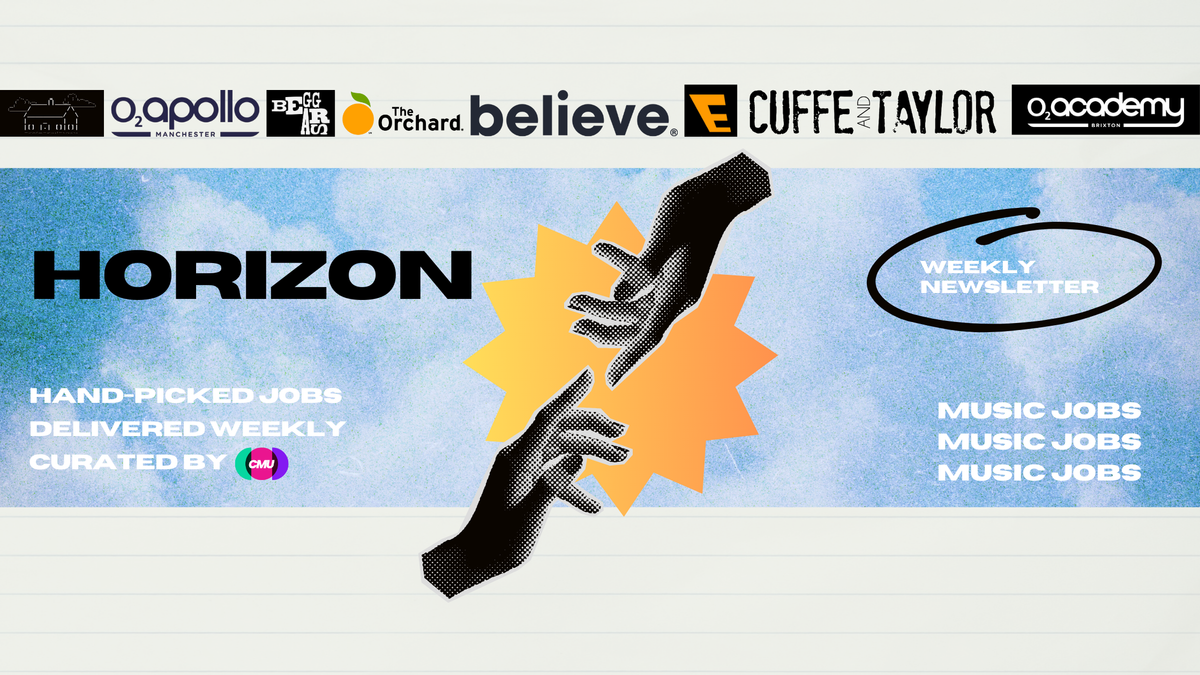As part of our Horizon Future Leaders series of interviews, we are connecting with the music industry’s next generation of leaders to gather candid advice and insights into their career journeys.
Horizon is CMU's weekly newsletter that brings you a hand-picked selection of early to mid stage career opportunities from across the music industry, paired with insights and advice. Whether you're looking for your first job in music or you're ready to take a step up, Horizon is here to help you find your dream job faster. Horizon is focused on highlighting the best and most exciting roles we've seen and is made for people who are building their careers with ambition.
Getting started and progressing your career in the music industry can often feel overwhelming. Despite the wide range of positions and opportunities available, early-career professionals often face a daunting array of challenges. From the frustrating cycle of needing experience to be able to get the roles that help you build experience, to often intense competition from like-minded peers, the barriers in music can sometimes seem higher than in many other fields.
At CMU we spend a lot of time trying to explain and demystify the music business, and our Horizon newsletter is dedicated to helping the next generation of music leaders build and progress their careers. Our new series of Q&A interviews, Horizon Future Leaders, talks to rising professionals from across the industry: to hear firsthand how they started out and what they have learnt along the way, sharing practical tips and advice for anyone looking to build and own their future in the music business.
👉 This week, we caught up with Maria Torres, Artist Manager at Mother Artists.
From her early internships at XL Recordings and Shazam to managing her own artists and gaining live experience at major festivals, Maria’s journey has led her to her current role at Mother Artists. She shares key insights into the unpredictable yet rewarding nature of artist management, the value of hands-on experience early in your career, and staying adaptable in the fast-evolving music industry.
What’s your current role in the music industry?
I am an Artist Manager at Mother Artists.
What does your general day to day look like?
You never know what the day is going to bring when working in management, which always keeps things exciting. The main thing is ensuring all the cogs are moving around each artist, from communicating with all suppliers, setting up releases, coordinating the live side of the business, and more. Management is very much a world where you're across everything in the artist's career.
What steps did you take early in your career to gain experience and build skills to get you where you are now?
I studied a degree in Music Industry Management at BIMM in Bristol, graduating in 2018. During my time at university, I completed internships at various companies, including XL Recordings, Shazam and DICE. I also worked at Thekla in Bristol and obtained experience in management by managing my own artists. Also, on the live side I worked at various festivals.
I ensured I maximised my time getting experience at university so I could get a full time job in music as soon as I graduated. From trying out so many different sectors, I knew I wanted to go into management full time. I then accepted a job at a management company in London in 2018 and have worked in management ever since. I started working at Mother Artists two years ago, and it's been very exciting to watch the company grow and be a part of that.
What opportunities did you explore early on that were particularly valuable?
I would say that my work experience at BBC Radio 1's Big Weekend in 2017 was a pivotal moment for me, as I met numerous contacts there, including a plugger who then recommended me for the internship at XL Recordings and for my first job in management.
People always say it's a ‘right place at the right time’ scenario, and it really was. I didn't know how valuable this work experience would be in opening so many doors for me.
Also, managing a band throughout my time at university gave me great insight into how the world of management works. I'm a big believer that you need to do things to learn things - and I really did, it helped me build the skills necessary for my first full time role in management.
Has the opportunity landscape changed since then?
I definitely think there are less internship and work experience opportunities compared to what there used to be. There are stricter rules now regarding internship hours/pay, which is great but it means that less companies are able to fund these opportunities unless through schemes like Youth Music, or government funding. Without these experiences, I wouldn't have been able to build my skill set so robustly so early on, so these opportunities are vital for a step up into the music industry. I really hope there are more schemes to fund these opportunities, as it's really important for the next generation to have these and making the music industry accessible.
Are there any specific internships, projects, or initiatives that you would recommend to newcomers looking to pursue a similar role?
I touched on Youth Music briefly in my previous answer, they're such a vital part of this industry in helping open doors for young people under the age of 25. They always have amazing opportunities for newcomers into the industry, so I'd recommend signing up to their newsletter. Youth Music helped fund a scheme I was on during the pandemic, called the Saffron Springboard Project, where I was able to develop my brand and identity as an independent manager. This then helped me apply for the MMF Accelerator fund which helped me grow even further as a manager.
If you want to go into management specifically, it's definitely worth signing up to the MMF and being a part of a community of managers - their resources and events are really useful and help managers keep up with the latest developments in the industry.
What advice do you have for building and leveraging a professional network in the music industry?
I would say that networking is vital in this industry, but it can't be forced. I would encourage people to attend music industry conferences such as The Great Escape, SWN Festival, Liverpool Sound City and the Un-Convention Manchester to name a few. The panel discussions are always very insightful and there are always great networking opportunities at these. I've met some amazing people when attending conferences, and it's really helped extend my network in a positive way.
I would also say don't be afraid to try things out and give things a go. If you want to be a manager, find an artist to manage and start there. You'll meet some great people along the way and that always helps build a network too.
How has the evolving digital landscape impacted your role, and where do you focus to stay ahead?
The impact of social media and digital development in management is quite evident in our day to day roles. Managers now have to maintain an array of social media platforms, and with the launch of new ones, continuously adding to these. It's another sector that managers have to adapt and control. Social media in particular is such a powerful marketing tool for artists, and utilised in the right way can be really beneficial in building a fanbase.
There's always so much to learn, so at Mother we try to ensure we're up to date on the digital landscape to ensure everything is covered in the best way possible. I am intrigued as to how the development of AI tools in particular might help in assisting managers with daily tasks at some point in the future. AI will never replace a manager, as our roles are very personal too - but it could help with tools for sure.
What trends or changes do you see on the horizon for the music industry, and how can early career professionals prepare for them?
The live market is a constantly changing landscape at the moment, especially with fans buying tickets last minute for shows post-pandemic. It's so hard to tell when a show is going to sell out due to this happening more often.
Also, so many headliner/stadium artists are taking huge amounts of tickets and fans' money out of the market, so it's much harder for developing and mid-size level artists to sell tickets for tours in advance. We need to foresee these trends happening and pivot our strategy accordingly. It's a very volatile place at the moment but it's interesting to see how things can change so quickly.
What’s one piece of advice you wish someone had given you at the start of your career?
Don't spread yourself too thin - it's better to focus on quality, not quantity. This will help with developing a long term career in this industry.



